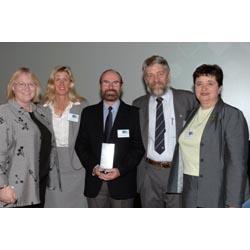$25,000 teaching award for 3-way Engineering partnership
Published on 28 November, 2006
Central Queensland University has expressed pride in this week's (November 28) announcement that its Bachelor of Engineering (Co-op)/Diploma of Professional Practice (Engineering) program has won a $25,000 Carrick Award for ' Programs that Enhance Learning’.
The award from the Carrick Institute for Learning and Teaching in Higher Education was given in the category of Educational Partnerships and Collaborations with Other Organisations and was presented by Education Minister Julie Bishop at Parliament House in an afternoon session.
The funds are given to CQU to provide further support for this innovative program.
 Those present at Old Parliament House during the evening for the Carrick Awards dinner were CQU representatives Professor Alex Radloff, Pro Vice-Chancellor (Academic Services) and Professor Elizabeth Taylor AO, Executive Dean, Faculty of Sciences, Engineering and Health, and program team representatives Associate Professor David Jorgensen, Prue Howard and Fons Nouwens. Other members of the winning program team include Ian Devenish, Dr Steven Senini and Shelley Fawcett.
Those present at Old Parliament House during the evening for the Carrick Awards dinner were CQU representatives Professor Alex Radloff, Pro Vice-Chancellor (Academic Services) and Professor Elizabeth Taylor AO, Executive Dean, Faculty of Sciences, Engineering and Health, and program team representatives Associate Professor David Jorgensen, Prue Howard and Fons Nouwens. Other members of the winning program team include Ian Devenish, Dr Steven Senini and Shelley Fawcett.
The University's Pro-Vice-Chancellor Academic Services, Professor Alex Radloff, said the award-winning CQU program is an innovative and highly successful professional engineering initiative providing work-integrated learning for students.
"The winning program reflects CQU's commitment to providing high-quality educational programs that ensure graduates are highly employable and sought-after by industry," Professor Radloff said.
Professor Taylor said the winning program is a 3-way co-operative partnership between the individual student, industry and the University. "Its central aim is to develop students with the attributes they need to function effectively as professional graduate engineers," Professor Taylor said. "Employers find it valuable for recruitment; it provides students with financial support and accelerates graduates’ preparation and development in assuming professional responsibilities".
Associate Professor Jorgensen said the initial introduction of Co-operative Education into the CQU engineering degree program structure in 1994 was in response to local industry demands for relevance in the engineering curriculum.
Since 1994, progressive improvements in the program have been made in response to research, stakeholder feedback and national and international needs. This led to the evolution of this innovative program, adding and integrating Project Based Learning (PBL) in 1998 and Professional Practice Development (PPD) in 2004, resulting in this unique dual award program.
In other universities’ engineering programs, practical work experience is often simply gained ad-hoc during vacation periods. The CQU engineering program’s co-operative education industry placements are integrated in the curriculum and provide two full-time paid placements during study terms. These provide a minimum of 12 months, but up to 18 months, of work experience before graduation.
The Diploma of Professional Practice was introduced to provide formal preparation for placement and reflective debriefing following each placement. It is integrated with, but identifiably separate from the academic engineering degree element of the program.
 "The distinctiveness of this dual award program is accentuated by a Project Based Learning approach designed to develop knowledge, skills and attitudes students require to function effectively, both during placements and in their graduate professional employment," Associate Professor Jorgensen said.
"The distinctiveness of this dual award program is accentuated by a Project Based Learning approach designed to develop knowledge, skills and attitudes students require to function effectively, both during placements and in their graduate professional employment," Associate Professor Jorgensen said.
"Additionally, students develop continuing professional development capabilities by undertaking distance education studies during their industry placements". Over the 11 years since Co-operative Education industry placements commenced, CQU, in partnership with approximately 200 employer organisations, has placed approximately 100 students in work placements every year. In 2006, employers offered 150 work placements, for 95 students.
Feedback indicates that the program is of significant benefit to students, employers and the University. Evidence supports the contention that the program has a strong and positive impact on student recruitment, learning, motivation and engagement, and that it also has a broad impact on students’ personal and professional development.
Photo: Professor Elizabeth Taylor, Prue Howard, Associate Professor David Jorgensen, Fons Nouwens and Professor Alex Radloff after receiving their Carrick Award for ' Programs that Enhance Learning’.

